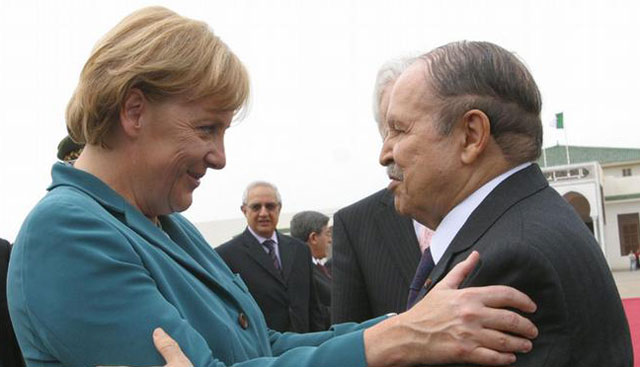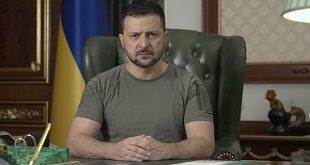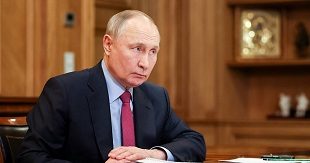
Algiers, Algeria | AFP |
Algeria’s President Abdelaziz Bouteflika had acute bronchitis on Monday, causing German Chancellor Angela Merkel to call off a visit to Algeria at the last minute, the presidency said.
Bouteflika, Algeria’s longest-serving leader, suffered a mini-stroke in 2013 that affected his mobility and speech.
The 79-year-old has since appeared in public on only a handful of occasions and has travelled several times to France for medical treatment.
“Algerian and German authorities have today mutually agreed to postpone the official visit” by Merkel, Algeria’s presidency said in a statement.
“This postponement is due to the fact that Mr Bouteflika, who is at his residence in Algiers, is temporarily unavailable due to acute bronchitis,” it said.
In Berlin, the chancellor’s office said: “The Algerian government asked at the last minute that the visit be called off” and Merkel had accepted this.
Algerians had expected Bouteflika — the North African country’s longest-serving leader — to step down at the end of his third term, but instead he won re-election in 2014, despite his frail health.
Bouteflika has been confined to a wheelchair since his stroke, entertaining foreign guests at his home in Zeralda west of the capital and making few public appearances.
Bouteflika travelled to France in November for “periodic medical checks”, but in recent months National Liberation Front chief Djamel Ould Abbes had said his health was improving — even mentioning a possible fifth term in 2019.
– ‘Serious problems’ –
“It’s the first time in Algerian diplomacy that such a visit has been cancelled,” political analyst Rachid Tlemcani said.
The last-minute cancellation of Merkel’s trip showed “the Algerian government was tackling serious problems”, he said, and reignited a debate about Bouteflika’s capacity to act as head of state.
“The situation in the country has become unmanageable due to the president’s state of health,” Tlemcani said.
“After the cancellation of this visit for a medical reason, it will be difficult for his supporters to defend the idea of a fifth term.”
Bouteflika’s opponents had spoken of a “power vacuum” since his stroke.
Elected for the first time in 1999, Bouteflika turns 80 on March 2.
The infirm leader made a rare public appearance in September, attending the opening of a new international conference centre in Algiers.
Flanked by his younger brother Said, a wheelchair-bound Bouteflika unveiled a plaque at the site before touring parts of the new complex, state television showed.
– African migrants –
Merkel had been due to arrive in the capital at 1700 GMT Monday as part of efforts to get North African countries to reduce the flow of migrants across the Mediterranean into Europe.
The German leader, who last week hosted Tunisian Prime Minister Youssef Chahed, hopes for partnerships with Maghreb countries and Egypt to prevent a new wave of migrants making the dangerous sea crossing to the European Union.
Algeria is a key actor in seeking to stabilise neighbouring Libya, which has lacked a functioning government since the 2011 overthrow of Moamer Kadhafi and has become the main gateway for African migrants bound for Italy.
But elsewhere in the region too, desperate people, many from sub-Saharan Africa, are trying to cross into the European Union — an influx the 28-nation bloc fears will rise again with the onset of warmer weather in spring.
Some 300 migrants on Monday stormed the double wire fence between Morocco and the Spanish North African territory of Ceuta, after nearly 500 made it over on Friday, one of the largest groups to do so in more than a decade.
Merkel’s North Africa diplomacy comes after she spearheaded a controversial EU deal with Ankara a year ago that helped sharply reduce the influx of migrants who passed through Turkey and western Balkan countries into the bloc.
Merkel, confronted with the rise of the anti-immigration AfD party ahead of elections in September, has been under intense pressure to reduce the number of asylum seekers in Germany, which has taken in more than one million migrants and refugees since 2015.
 The Independent Uganda: You get the Truth we Pay the Price
The Independent Uganda: You get the Truth we Pay the Price


